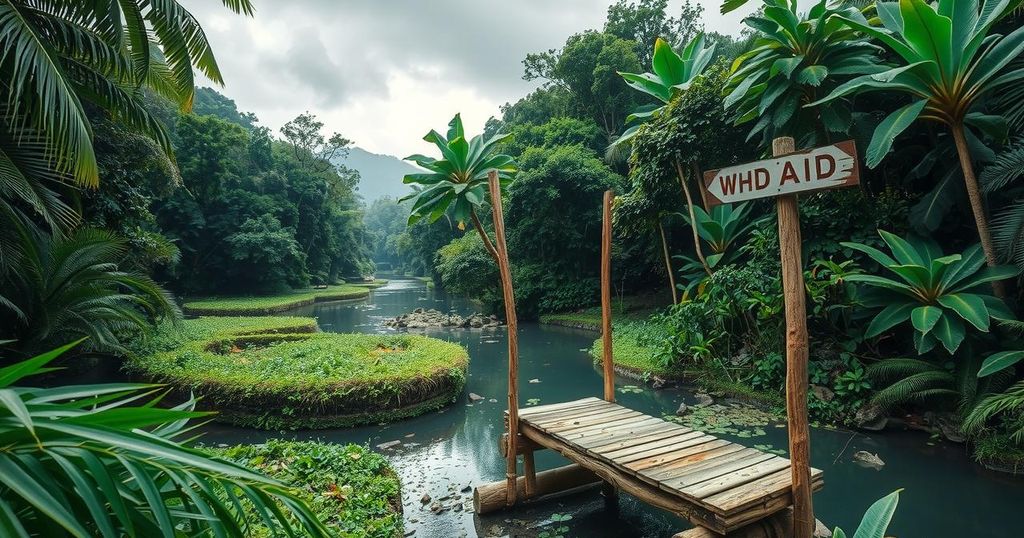The U.S. Agency for International Development’s dismantling threatens vital humanitarian and environmental initiatives in South America, particularly affecting programs combating cocaine production and supporting Venezuelan migrants. Concerns mount regarding the future of funding for projects focused on climate change and minority rights, leaving communities vulnerable amid shifting U.S. foreign policy. The implications of these changes could undermine decades of cooperative efforts aimed at promoting sustainability and social well-being in the region.
The impending dismantling of the U.S. Agency for International Development (USAID) poses significant threats to various humanitarian and environmental initiatives across South America, particularly in Colombia, Brazil, and Peru. This withdrawal will greatly impact assistance programs aimed at combating cocaine production, protecting Amazonian biodiversity, and aiding displaced Venezuelans. Many projects, particularly those focused on climate change and minority rights, now face uncertain futures amid fears of losing vital funding.
In Colombia, USAID has been the largest source of assistance, aiding over 2.8 million Venezuelans amid an economic crisis. Recent financing from USAID included $45 million contributed to the U.N. World Food Programme in 2024. However, with the U.S. administration’s current stance on foreign aid, the humanitarian landscape may face dire repercussions, especially for vulnerable populations like Venezuelan migrants.
President Gustavo Petro of Colombia expressed discontent regarding U.S. aid interventions, asserting that some support is unwelcome. His comments reflect a growing sentiment among leaders in Latin America who question the efficacy of U.S. assistance, framing it as a form of economic control.
In Brazil, USAID’s substantial initiatives, including partnerships aimed at conserving the Amazon, are now jeopardized. Organizations like the Roraima Indigenous Council, which have benefitted from USAID funding for sustainable activities, are at risk of losing crucial support, affecting their ability to maintain both environmental and economic projects.
Similar challenges extend to Peru, where USAID has historically supported crop substitution efforts to mitigate cocaine production. The current administration expressed plans to continue such initiatives independently, which raises questions about the effectiveness of U.S. aid in the region. Critics suggest that the cessation of U.S. funding could provide an opportunity to foster autonomy in addressing cocaine production challenges without external conditions.
Overall, the potential withdrawal of USAID signals a significant shift in U.S. foreign policy toward South America, highlighting a departure from supporting critical humanitarian and environmental efforts. The implications of this decision could resound through local communities already facing instability, reinforcing the urgency for new strategies that promote sustainability and assistance without reliance on foreign aid.
The U.S. Agency for International Development (USAID) has historically played a crucial role in providing humanitarian aid and fostering environmental conservation in South America. Integral programs have focused on coca eradication in Peru, biodiversity protection in Brazil, and humanitarian assistance for Venezuelan migrants in Colombia. The recent decision by President Trump to dismantle USAID reflects a broader shift in U.S. foreign policy that prioritizes domestic concerns, casting doubt on the future effectiveness of assistance programs designed to combat critical issues such as drug trafficking, poverty, and environmental degradation in the region.
The potential dissolution of USAID underscores a pivotal moment in U.S.-Latin America relations, jeopardizing established humanitarian and conservation efforts across Colombia, Brazil, and Peru. With funding cuts, local initiatives aimed at addressing rampant cocaine production and preserving fragile ecosystems are at risk, emphasizing the need for innovative and sustainable alternatives to the traditional model of foreign assistance. This situation highlights the vulnerabilities of marginalized communities as they confront both economic challenges and threats from organized crime without adequate support.
Original Source: www.newsday.com




